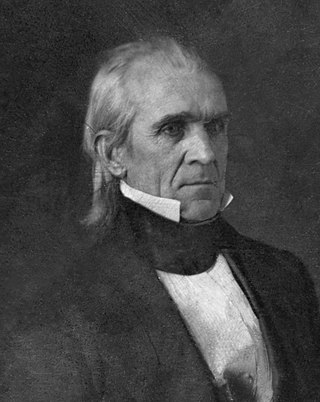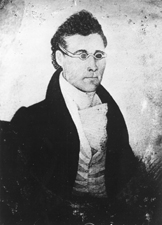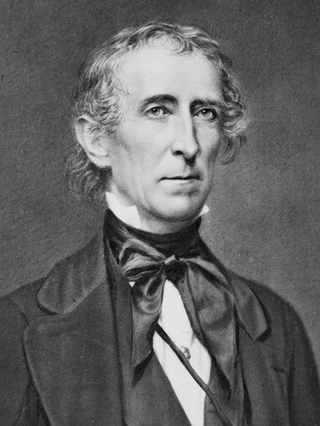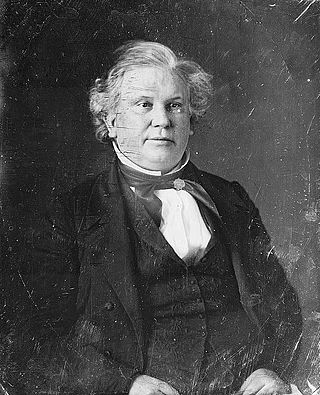Related Research Articles

Martin Van Buren was an American lawyer and statesman who served as the eighth president of the United States from 1837 to 1841. A primary founder of the Democratic Party, he served as New York's attorney general, U.S. senator, then briefly as the ninth governor of New York before joining Andrew Jackson's administration as the tenth United States secretary of state, minister to the United Kingdom, and ultimately the eighth vice president of the United States when named Jackson's running mate for the 1832 election. Van Buren won the presidency in 1836, lost re-election in 1840, and failed to win the Democratic nomination in 1844. Later in his life, Van Buren emerged as an elder statesman and an important anti-slavery leader who led the Free Soil Party ticket in the 1848 presidential election.

The 1836 United States presidential election was the 13th quadrennial presidential election, held from Thursday, November 3 to Wednesday, December 7, 1836. In the third consecutive election victory for the Democratic Party, incumbent Vice President Martin Van Buren defeated four candidates fielded by the nascent Whig Party.

The 1840 United States presidential election was the 14th quadrennial presidential election, held from Friday, October 30 to Wednesday, December 2, 1840. Economic recovery from the Panic of 1837 was incomplete, and Whig nominee William Henry Harrison defeated incumbent President Martin Van Buren of the Democratic Party. The election marked the first of two Whig victories in presidential elections.

The 1844 United States presidential election was the 15th quadrennial presidential election, held from Friday, November 1 to Wednesday, December 4, 1844. Democrat James K. Polk defeated Whig Henry Clay in a close contest turning on the controversial issues of slavery and the annexation of the Republic of Texas. This is the only election where both major party nominees served as Speaker of the House at one point.

William Christian Bouck was an American politician from New York. He was the 13th Governor of New York from 1843 to 1844.

Felix Grundy was an American politician who served as a congressman and senator from Tennessee as well as the 13th attorney General of the United States.

Benjamin Franklin Butler was a prominent lawyer from the state of New York. A professional and political ally of Martin Van Buren, among the many elective and appointive positions he held were Attorney General of the United States and United States Attorney for the Southern District of New York. He was also a founder of New York University and one of the founders of the Children's Village school in New York City.

John Milton Niles was a lawyer, editor, author and politician from Connecticut, serving in the United States Senate and as United States Postmaster General 1840 to 1841.

Ely Moore was an American newspaperman and labor leader who served two terms as a Jacksonian U.S. Representative from New York from 1835 to 1839.

Samuel McRoberts was a United States senator from Illinois. Born near Maeystown, he was educated by private tutors and graduated from the law department of Transylvania University in Lexington, Kentucky. He was admitted to the bar in 1821 and commenced practice in Monroe County, and was clerk of the circuit court of Monroe County from 1819 to 1821. He was State circuit judge from 1824 to 1827 and a member of the Illinois State Senate from 1828 to 1830.

The United States District Court for the Eastern District of Tennessee is the federal court in the Sixth Circuit whose jurisdiction covers most of East Tennessee and a portion of Middle Tennessee. The court has jurisdiction over 41 counties with 4 divisions. Based in Knoxville, Tennessee, it maintains branch facilities in Chattanooga, Tennessee; Greeneville, Tennessee; and Winchester, Tennessee.
John Chamberlain Clark was an American lawyer and politician who served four terms as a United States representative from New York from 1827 to 1829 and from 1837 to 1843.
John Van Buren was an American attorney and politician in the U.S. state of New York. He represented New York in the United States House of Representatives and New York State Assembly in addition to serving terms as county judge and district attorney of Ulster County.

The presidency of Martin Van Buren began on March 4, 1837, when Martin Van Buren was inaugurated as President of the United States, and ended on March 4, 1841. Van Buren, the incumbent vice president and chosen successor of President Andrew Jackson, took office as the eighth United States president after defeating multiple Whig Party candidates in the 1836 presidential election. A member of the Democratic Party, Van Buren's presidency ended following his defeat by Whig candidate William Henry Harrison in the 1840 presidential election.

John Tyler was the tenth president of the United States, serving from 1841 to 1845, after briefly holding office as the tenth vice president in 1841. He was elected vice president on the 1840 Whig ticket with President William Henry Harrison, succeeding to the presidency following Harrison's death 31 days after assuming office. Tyler was a stalwart supporter and advocate of states' rights, including regarding slavery, and he adopted nationalistic policies as president only when they did not infringe on the states' powers. His unexpected rise to the presidency posed a threat to the presidential ambitions of Henry Clay and other Whig politicians and left Tyler estranged from both of the nation's major political parties at the time.

Peter Vivian Daniel was an American jurist who served as an associate justice of the Supreme Court of the United States.

John Young Mason was a United States representative from Virginia, the 16th and 18th United States Secretary of the Navy, the 18th Attorney General of the United States, United States Minister to France and a United States district judge of the United States District Court for the Eastern District of Virginia.
John A. Corwin was a Democratic politician and jurist from Ohio, United States. He was elected to the Ohio Supreme Court and ran unsuccessfully for the United States House of Representatives.

In 1840, William Henry Harrison was elected President of the United States. Harrison, who had served as a general and as United States Senator from Ohio, defeated the incumbent president, Democrat Martin Van Buren, in a campaign that broke new ground in American politics. Among other firsts, Harrison's victory was the first time the Whig Party won a presidential election. A month after taking office, Harrison died and his running mate John Tyler served the remainder of his term, but broke from the Whig agenda, and was expelled from the party.
References
- "Israel Hamilton (1799 – 1842)". Find a Grave. 3 Oct 2008.
- The History of Champaign county, Ohio: ... Chicago: W H Beers. 1881. p. 205.
- "History of the U.S. Attorney Southern District of Ohio". United States Attorney's Office Southern District of Ohio. 23 July 2015.